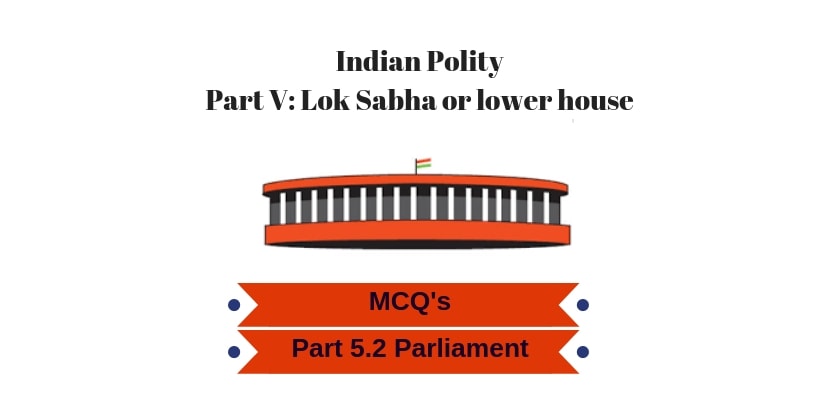Indian Polity: Lok Sabha or lower house
Lok Sabha is the lower house of the bicameral Parliament of India. The Lok Sabha is composed of representatives of the people elected by direct election on the basis of adult franchise. The maximum seats of the House envisaged by the Constitution is 552, in which 530 are elected members from the representative of the States, 20 members are elected from Union Territories and 2 nominated members of the Anglo-Indian Community by the President of India.
Lok Sabha reserved seats :
A total of 131 seats (24.03%) are reserved for Scheduled Castes (84) and Scheduled Tribes (47) representatives.
The quorum of the house:
The presence of at least 10 percent of the total strength of House or about 55 members makes the quorum. The Lok Sabha continues to work for five years from the date appointed for its first meeting until it is dissolved. However, when an emergency is announced, this period can be extended by law by the law.
The original Constitution had a term of Lok Sabha as 6 years. It was changed to 5 years by Constitution 44th Amendment Act 1978.
Qualifications to become a Lok Sabha member:
Article 84 (Part V.—The Union)of Indian Constitution sets qualifications for being a member of Lok Sabha, which is as follows:
1. He / She should be a citizen of India.
2. He / She should not be less than 25 years of age.
3. He / She possesses such other qualifications as may be prescribed in that behalf by or under any law made by Parliament.
4. He / She should not be proclaimed criminal i.e. they should not be a convict, a confirmed debtor or otherwise disqualified by law.
5. He / She should have his/her name in the electoral rolls in any part of the country.
6. If he/she is of unsound mind and stands so declared by a competent court.
Lok Sabha is a part of Parliament, so all the articles are same, some important articles we mention here:
Article 81: deals with the Composition of the Lok Sabha.
Article 331: Members nominated from Anglo-Indian Community.
Article 326: provides that the elections for Lok Sabha MPs.
Article 330(1): seats are reserved in Lok Sabha for SCs and STs.
Read also:
Part V Chapter II -Lok Sabha MCQ’s
1. What is the minimum age to become a member of Lok Sabha?
A. 30 years
B. 18 years
C. 25 years
D. 35 years
[toggle] Answer – C [/toggle]
2. What is the strength of the total elected members of 14th Lok Sabha?
A. 545
B. 543
C. 552
D. 550
[toggle] Answer – B [/toggle]
3. The first female Speaker of Lok Sabha is :
A. Vijay Laxmi Pandit
B. Sucheta Kripalani
C. Tarkeshwari Sinha
D. Meira Kumar
[toggle] Answer – D [/toggle]
4. The State of Uttar Pradesh accounts for :
A. 60 Lok Sabha seats
B. 70 Lok Sabha seats
C. 80 Lok Sabha Seats
D. 90 Lok Sabha seats
[toggle] Answer – C [/toggle]
5. Which among the following states sends the highest number of parliamentarians in Lok Sabha?
A. Maharashtra
B. Bihar
C. Andhra Pradesh
D. Tamil Nadu
[toggle] Answer – A [/toggle]
6. Which of the following is not a session of Lok Sabha?
A. Budget session
B. Summer session
C. Winter session
D. Monsoon Session
[toggle] Answer – B [/toggle]
7. What is the maximum strength of the Lok Sabha envisaged by the Constitution?
A. 545 members
B. 550 members
C. 552 members
D. 535
[toggle] Answer – C [/toggle]
8. How many members are elected in the Lok Sabha from the Union Territories (according to Constitutional provision)
A. 20
B. 22
C. 30
D. 35
[toggle] Answer – A [/toggle]
9. During the proclamation of emergency is in operation the term of Lok Sabha may be extended at a time for a period not exceeding:
A. 2.5 years
B. 1 year
C. 1.5 years
D. Depend on the discretion of the President
[toggle] Answer – B [/toggle]
10. Which feature of the Indian Constitution is not taken from the American Constitution?
A. Preamble
B. Single citizenship
C. Judicial Review
D. Fundamental Rights
[toggle] Answer – B [/toggle]

